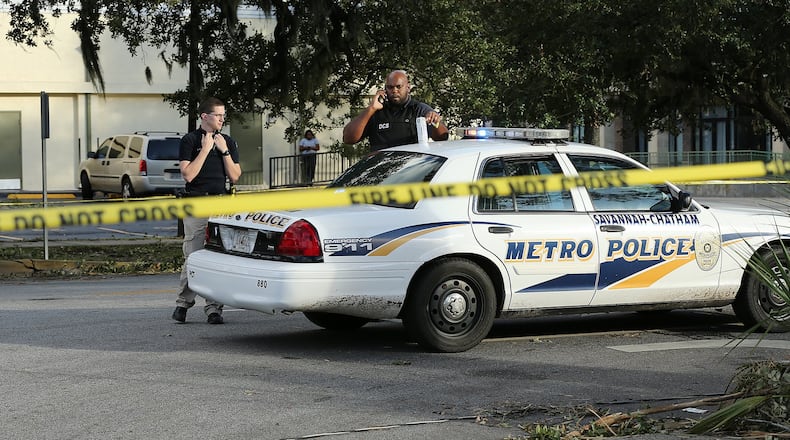Was Ricky Boyd threatening Savannah officers with a BB gun when police fatally shot him in January?
The push to answer that question intensified this month as the 20-year-old former prom king's death drew national attention and a Georgia state senator requested an outside review by the U.S. Justice Department.
Contradicting accounts about what happened Jan. 23 when police confronted Boyd in his grandmother’s front yard have also renewed questions about the use of police camera footage to evaluate officer conduct and the appropriate time to release such footage.
Authorities allowed Boyd’s mother, Jameillah Smiley, and other family members to privately view body-cam footage of the shooting about a week after the incident. And the family says the video tells a different story than what police have put out to the public. From the start, police say Boyd threatened them with a gun and officers shot him in self defense.
“He had nothing in his hands,” Smiley said. “You can see his hands clear as day.”
Smiley’s lawyer, Will Claiborne, has collected evidence the BB gun was found 43 feet from where Boyd was shot and Smiley said the police video shows her son with his hands empty and ready to surrender to police before they shot him multiple times
Chatham County District Attorney Meg Heap has resisted the calls of Smiley and her supporters to release the video, as have the Savannah Police Department and the Georgia Bureau of Investigation, which deferred the decision to Heap.
Georgia law gives broad discretion to law enforcement and prosecutors to withhold police videos or other evidence in an active investigation, said Peter Canfield, a First Amendment lawyer in Atlanta. He said state law governing the release of police video has become murkier over the years and more restrictive.
“There’s tremendous public interest in actually seeing video of these incidents so the public can judge for themselves whether police conduct was appropriate or not,” he said. “Many states make these publicly available as a matter of course.”
Boyd’s family and community supporters are planning to attend the Savannah City Council’s Thursday meeting and demand release of the video and more information about the shooting. Three months have passed and authorities still haven’t released the names of the officers involved or their status with the department.
The lack of answers have left Smiley struggling to understand why police shot her son in front of his grandmother and four younger siblings.
“It’s been very frustrating,” she said. “I”m not getting any answers.”
The lack of information about the shooting has led to increasing criticism of Heap and raised questions about local officials' handling of the case. The PBS Newshour ran a lengthy segment on the case Monday and civil rights activist and television host Rev. Al Sharpton tweeted about the case to his 560,000 followers on Wednesday, imploring authorities to "release the body cam footage NOW."
Last Thursday, State Senator Lester G. Jackson, D-Savannah, stepped up pressure on the district attorney, stopping just short of accusing her and her office of mishandling the case. Jackson asked U.S. Attorney Jeff Sessions to step in and move the investigation from state and local authorities to federal investigators.
Transferring the case “to the U.S. Justice Department will help avoid potential bias within the local District Attorney’s office and will help restore the community’s trust in this investigation,” Jackson said in a letter to Sessions. The Justice Department did not respond to a request for comment.
Heap says she is moving forward with the case and an orderly review of the evidence. She received the GBI’s investigation a couple of weeks ago. She said she plans to bring the case to a civil grand jury as early as next month and wants the facts to come out through that process and, potentially, in the courts. She accused Smiley’s attorney of putting out misinformation, but would not offer specific details.
“I think it’s unethical to be discussing a case before it goes to court,” she said.
Expert: transparency best practice
Her move to take the case to a civil grand jury signals that she will likely not seek an indictment against any of the officers.
In most criminal cases, a district attorney reviews the evidence and then makes a determination whether to bring an indictment before a criminal grand jury that decides if the person is charged and the case can proceed to a criminal trial. A 2015 AJC/Channel 2 Action News investigation of fatal police shootings in Georgia found officers are almost never charged when they shoot and kill someone.
One reason is prosecutors hardly ever bring an indictment forward for a grand jury to consider. Instead, they often opt for a civil grand jury which does not involve presentation of an indictment for jurors to consider. If the case is closed without any charges, district attorneys can lean on the grand jury decision as the reason, providing political cover for these elected law enforcement officials.
Heap doesn’t agree with that assessment. She said the civil grand jury is a way to consider all the evidence from witnesses and provide a public record afterward through a transcript of the closed-door proceedings. She said the process she has in place will ensure the case is decided in court and the evidence is fairly heard.
“I firmly believe this is the best way to make sure it’s as transparent as possible,” Heap said.
None of the turns in the case are particularly surprising to Geoffrey Alpert, a national expert on police shootings at The University of South Carolina, who has observed how authorities handle video’s in police shooting cases across the country. Alpert is not directly following the Boyd case, but he said many law enforcement officials still withhold critical information that would help the public understand the officer conduct. He said in light of the scrutiny of police conduct since the 2014 Ferguson shooting, more law enforcement officials see the value of getting information out quickly so the community can understand the facts.
“The bottom line is departments ought to be transparent unless there’s a compelling reason not to be,” he said. “There is no national standard. There is no best practice other than to be transparent.”
He said when questions and contradictions arise in the official police version of events, it’s imperative they be addressed to ensure public confidence in the investigation and its eventual outcome. Waiting months to release video can chip away at public confidence in law enforcement.
“The smart leaders want it released,” he said.
Video disputes official account
The void of public information from police and prosecutors has been partially filled by evidence uncovered by attorney Claiborne who has produced a YouTube video critical of authorities and their handling of the case.
The video calls Savannah Police Chief Mark Revenew’s initial public statement the day of the shooting a lie. At a press briefing in January after the shooting, Revenew said that Boyd initiated gunfire. He said an officer was wounded and police returned fire. That turned out to be false. Through a spokeswoman, Revenew declined to comment about the case.
Police said Boyd was a suspect in a murder that occurred a couple of days before the shooting, but Claiborne said police got that wrong, too. Claiborne said Boyd was wrongly shot in front of his grandmother and four younger siblings when police showed up to arrest him early in the morning. Part of the reason the family wants the police video and other facts from the investigation released is so Boyd can be cleared of suspicion posthumously.
Since the shooting, Smiley said an investigator with the Savannah police told her authorities know her son didn’t commit murder. Claiborne said the family, at this point, has no confidence in the ability of local officials ability to get to the truth.
“Police shootings are not “a local matter” — they are a national disgrace,” said Claiborne. “What is a family supposed to do when local officials are lying? Ricky’s family deserves, and Savannah deserves, a full, fair, and impartial investigation into Ricky’s death.”
Our reporting
The Atlanta Journal-Constitution has published award-winning coverage of police shootings in Georgia, and in 2015 assembled the first-ever database of fatal police shootings in Georgia in collaboration with Channel 2 Action News. Today’s story examines a controversial police shooting in Savannah, and the issues surrounding the release of police body-camera footage in shootings.
About the Author
The Latest
Featured




